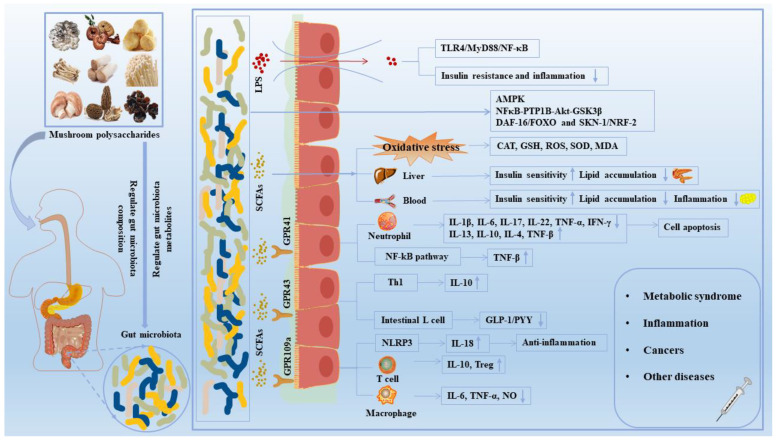Figure 3.
The effect of mushroom polysaccharides on human diseases by the regulation of gut microbiota. Mushroom polysaccharides could regulate the composition and relative abundance of gut microbiota and promote the production of SCFAs. SCFAs bond to receptors such as GPR41, GPR43 and GPR109A, activating downstream NF-κB, MAPK and other signaling pathways, thereby improving the intestinal mucosal barrier and maintaining intestinal homeostasis. In addition, SCFAs exerted an anti-diabetic and anti-obesity role by alleviating oxidative stress damage and regulating liver and blood biochemical indexes. Notably, harmful gut microbiota induced inflammation and insulin resistance by stimulating LPS secretion and activating TLR4/MyD88/NF-κB pathways. ↑, increased; ↓, decreased; CAT, catalase; GLP-1, glucagon-like peptide-1; GPR 109a, G protein-coupled receptor 109A; GPR 43, G protein-coupled receptor 43; GPR 41, G protein-coupled receptor 41; GSK3β, glycogen synthase kinase 3β; GSH, glutathione; IFN-γ, interferon-γ; IL, interleukin; LPS, lipopolysaccharide; MDA, malondialdehyde; MyD88, myeloid differentiation factor 88; NF-κB, nuclear factor-κB; NO, nitrogen monoxide; PYY, peptide YY; ROS, reactive oxygen species; SCFAs, short-chain fatty acids; SOD, superoxide dismutase; Th, helper T cell; TLR4, toll-like receptor 4; TNF-α, tumor necrosis factor-α.

